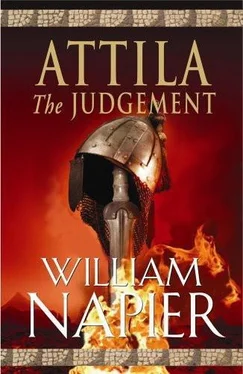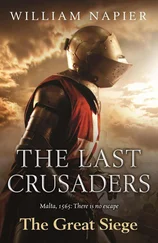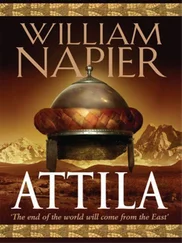William Napier - The Judgement
Здесь есть возможность читать онлайн «William Napier - The Judgement» весь текст электронной книги совершенно бесплатно (целиком полную версию без сокращений). В некоторых случаях можно слушать аудио, скачать через торрент в формате fb2 и присутствует краткое содержание. Жанр: Исторические приключения, на английском языке. Описание произведения, (предисловие) а так же отзывы посетителей доступны на портале библиотеки ЛибКат.
- Название:The Judgement
- Автор:
- Жанр:
- Год:неизвестен
- ISBN:нет данных
- Рейтинг книги:5 / 5. Голосов: 1
-
Избранное:Добавить в избранное
- Отзывы:
-
Ваша оценка:
- 100
- 1
- 2
- 3
- 4
- 5
The Judgement: краткое содержание, описание и аннотация
Предлагаем к чтению аннотацию, описание, краткое содержание или предисловие (зависит от того, что написал сам автор книги «The Judgement»). Если вы не нашли необходимую информацию о книге — напишите в комментариях, мы постараемся отыскать её.
The Judgement — читать онлайн бесплатно полную книгу (весь текст) целиком
Ниже представлен текст книги, разбитый по страницам. Система сохранения места последней прочитанной страницы, позволяет с удобством читать онлайн бесплатно книгу «The Judgement», без необходимости каждый раз заново искать на чём Вы остановились. Поставьте закладку, и сможете в любой момент перейти на страницу, на которой закончили чтение.
Интервал:
Закладка:
Aetius nodded. The sun was indeed, as usual, coming round. With every delay, the Huns would have to fight facing more and more directly into it.
The commander of the superventores reappeared, still at the run. Well, special forces were expected to be able to cover forty miles in a day with sixty-pound packs on their backs. This was a nice day out for them.
He saluted. ‘Job done, sir.’
‘Casualties?’
‘None, sir, apart from one novice who slipped coming out of the river and bloodied his pug. Getting bandaged up right now.’
Aetius grinned. ‘Good man. To the rearguard now. There’ll be more work for you later.’
‘Sir.’
It was late morning, and still nothing. Attila’s delaying tactics were wearisome to the Romans, but they would test his own, undisciplined warriors’ patience to the limit. Sooner or later they were going to have to charge. That mile between them would tire them, especially with their horses, poorly fed for these past weeks and months. And then they would hit the earthed-up pikes of the Alans and, behind them, the Roman legionaries. That was what Aetius wanted. As for the coming arrow-storm, he had two ways to deal with that.
Meanwhile the two armies stood motionless, and the sun kept coming round. Tube-like dracones, wind-socks, droned in the wind. The Hun horses stamped restively. Occasionally there were sorties from their lines, jeered at and sharply rebuffed, the horsemen retreating in disorder. Then as the air warmed a light southerly breeze blew up.
Aetius looked sharply at his centurion.
Tatullus produced a small white feather, raised it above his head and let go. It twirled briefly, then drifted steadily towards the Hun lines.
The centurion looked around, scanned the horizon. ‘A calm summer’s day. June. Gaul. A few clouds low in the west.’ He grinned at Aetius. ‘Yep. I reckon.’
Aetius nodded, and Tatullus roared over the front rank, ‘Fire the smokescreen!’
Immediately a great sheet of flame coursed along before the Roman line, and then quickly burned down to thick smoke. The auxiliaries ran between the files and poured on oil and dead branches, sacks of leaves, commandeered haybales and, best of all, thick green summer grass. The pall of smoke thickened, rose into the air forty, fifty feet, and drifted always north towards the Hun lines. In a few minutes they’d be blinded by it. And, when they came through it, by the sun.
Sweaty hands tightened around butted pikes, men crouched low. Some used corners of grimy neckerchiefs to wipe the sweat trickling down their foreheads and stinging their eyes, then quickly returned their hands to their pikes. The sweat would have to drip, because they all felt it now. The earth was rumbling. Beyond the smoke, the Huns were charging.
The next noise was the distant, muffled strum of the torsion springs of the Lightning Boys’ arrow-firers and sling-machines. Of course. From their position they could see the Huns charging below them. Thank God they held that hill. Then there were the screams of men and horses erupting soprano above the deep rumble of the charge. First blood. Those steel-head bolts were hitting home, horses rolling forward and tripping, the charge running in behind, getting tangled.
The smokescreen had worked. The Huns weren’t firing, not through that thick curtain. They were coming through it.
‘Steady, lads!’ shouted Aetius. ‘Lean all your weight on those pikes, now. Hold the line. Here they come.’
Many of them saw it in slow and dreamlike motion. Out of that drifting, cloudy wall of smoke only thirty or forty yards in front of their pikes, first emerged those big, brutish horses’ heads, and their hooves, and legs, then the whole animals, and riding them the naked savages, spiralling their swords, hatchets and lassos above their shaven, tattooed heads, howling like demons loosed from hell.
They hit the Alans hardest, but not before the Roman legionaries had stood up behind and hurled their javelins from their jointed javelin-throwers in a ferocious volley, so perfectly aimed and timed that perhaps every other front-rank Hunnish horseman was brought down, slowing his comrades behind and tangling them up just where they didn’t want to be. Many flew to the ground and lay uninjured but stunned. Then the Alan lancers broke rank and ran out to butcher them where they lay.
‘Back into line you fools! Hold formation! Pull back now!’
But the Alans lacked the discipline. Seeing what they thought was the impotent chaos of the Huns before them, they acted as headstrong individuals, dropping their pikes and pushing forward, drawing their swords. It was madness. Though a hundred or more Huns had fallen in that first javelin volley, many more were coming on behind, and those who had lost their horses and been stunned in falls were instantly on their feet again, daggers and sharpened chekans in hand. The Alans were surrounded and cut to pieces.
Sangiban, watching from his horse, bellowed with anger. ‘Shoot them!’ he screamed. ‘Where are you, archers?’
But Aetius’ men could not shoot without hitting the disordered Alan footsoldiers, who were slaughtered before their eyes. Cornered, the Alans fought like lions, it was true, but without formation they were lost.
‘Herculians, move up. Take pike positions.’
It was a relief to know that those old hands would hold the line: hold it until they were cut down where they stood.
The milling Hun horsemen, their charge broken by the enemy javelins and by their own bloodlust as they paused to stab and scalp the bewildered and fallen Alans, came on again but without discipline, single vainglorious warriors hurling themselves on the line of pikes yelling, ‘Astur is Great and will prevail!’ only to be skewered and dashed to the ground. Time and again horses reared, screaming, their riders flung back, hooves scrabbling in the air, a pike-head buried deep in their mighty chests. The legionaries knew better than to admire their handiwork, promptly dragging their pikes free and butting them in the ground again. The next attack would soon come round.
‘Arrow-storm coming in!’ went up a cry from the wing. Instantly the rear-rank troops raised their shields above their heads and locked together. Arrows skidded off the bronze, thocked down into the leather and wood, and stuck there, quivering. Legionaries dropped their shields down in front of them and lopped off the arrow-shafts with their swords. Here and there a cry went up as a man was hit, too slow with his shield or just unlucky. But Aetius could judge immediately from the thinness of the cries that little damage had been done. Now came his new tactic, for he knew how the Huns would fight.
The front line had come in charging and was stuck on the Roman pikes. Meanwhile, lightly armed horse-archers were galloping back and forth behind them, intending to loose off their arrow-storm over the heads of their front-rank comrades and down onto the Romans’ rear ranks. That was their plan. But the moment they began, Aetius gave the nod and the heavy Visigothic cavalry rode out, visors lowered, shields hefted, mighty ashwood lances couched.
They galloped round the rear of the fighting lines in a gigantic sweep, through the smokescreen, and scythed into the Hun horse-archers from behind. Many of the archers barely had time to turn before that great gleaming metallic serpent, head diamond-shaped like a pit viper, cut through them and bowled them apart, wreaking havoc. Nor did they stop for one moment, cutting across in front of the main Hunnish army, round the hill, and back to their station on the Romans’ right wing. In their wake were the strewn and broken bodies of many hundreds.
While the triumphant Visigothic cavalry drew breath, the artillerymen on the hill piled in, loosing their arrows sidelong into any Huns crossing the field to engage the line of pikes. Attila must be cursing. That hill was proving pivotal, a permanent outflanking fixture. Once battle was messily engaged, no one could shoot close to their own. But from that accursed hill…
Читать дальшеИнтервал:
Закладка:
Похожие книги на «The Judgement»
Представляем Вашему вниманию похожие книги на «The Judgement» списком для выбора. Мы отобрали схожую по названию и смыслу литературу в надежде предоставить читателям больше вариантов отыскать новые, интересные, ещё непрочитанные произведения.
Обсуждение, отзывы о книге «The Judgement» и просто собственные мнения читателей. Оставьте ваши комментарии, напишите, что Вы думаете о произведении, его смысле или главных героях. Укажите что конкретно понравилось, а что нет, и почему Вы так считаете.












